Welcome to the DarkDaily.com White Paper Library
Created and maintained as a service to the Clinical and Anatomic Pathology Industry, this unique White Paper program provides laboratory executives with:
- An important and useful resource for knowledge and information about the management of labs
- A direct link between the educational topics of each White Paper and related Industry businesses
Download any White Paper in the library absolutely FREE of charge!
Check out our library below with its many important and useful topics, then take advantage of our free download service. Contact Ron Martin today at 512-264-7103 to learn more about our successful White Paper program and how you can be a part of it!
|

Personalized medicine and predictive medicine have become a reality. As a result, your clinical diagnostic laboratory’s need for a molecular information management system (MIMS) will become increasingly important. The Dark Report is pleased to offer this FREE White Paper, providing a detailed discussion on the whys and hows of unlocking the potential of molecular diagnostics to the benefit of your laboratory, and the contributions it can make to patient care.
 |
|
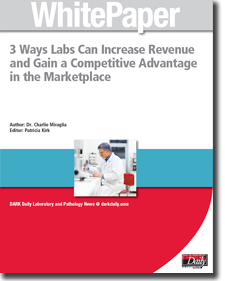 Providing superior, consistent service is essential to thriving in today’s healthcare environment. By revealing and overcoming challenges that are often overlooked amid day-to-day operational pressures, laboratory managers and executives can put their facilities on a path to delivering the best possible service, and boosting financial profitability. The Dark Report is pleased to present this FREE White Paper, offering high-performance labs actionable steps they take to exceed client expectations, while reducing costs and increasing revenue. Providing superior, consistent service is essential to thriving in today’s healthcare environment. By revealing and overcoming challenges that are often overlooked amid day-to-day operational pressures, laboratory managers and executives can put their facilities on a path to delivering the best possible service, and boosting financial profitability. The Dark Report is pleased to present this FREE White Paper, offering high-performance labs actionable steps they take to exceed client expectations, while reducing costs and increasing revenue.
|
|
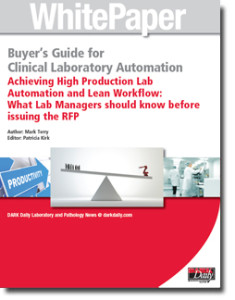 This Free White Paper providing practical insights and indispensable information to help lab managers and executives maximize their return-on-investment in a lab automation system, based on their own lab’s configuration, workflow, and budget. This paper outlines a multi-step plan for analyzing a lab’s processes to determine how well a specific lab automation system might fit or integrate into the lab’s current workflow and existing systems and technologies. This Free White Paper providing practical insights and indispensable information to help lab managers and executives maximize their return-on-investment in a lab automation system, based on their own lab’s configuration, workflow, and budget. This paper outlines a multi-step plan for analyzing a lab’s processes to determine how well a specific lab automation system might fit or integrate into the lab’s current workflow and existing systems and technologies.

|
|
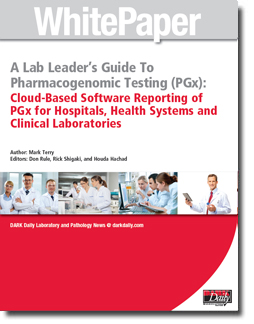 After reviewing this White Paper, you will possess a greater understanding of the obstacles physicians, laboratories and hospitals face when launching a pharmacogenomics program, how PGx testing can be used to drive patient care, and the important role cloud-based software can play in making PGx testing a practical and cost-effective solution. After reviewing this White Paper, you will possess a greater understanding of the obstacles physicians, laboratories and hospitals face when launching a pharmacogenomics program, how PGx testing can be used to drive patient care, and the important role cloud-based software can play in making PGx testing a practical and cost-effective solution.

|
|
 The Dark Report is pleased to offer this FREE White Paper providing you with a detailed discussion on the considerations of investing in a best-of-breed anatomic pathology-specific laboratory information system, and the reasons why even a solid enterprise-wide EHR and/or LIS solution may be insufficient for the complexities of your anatomic pathology (AP) laboratory and its distinct needs in terms of workflow, data mining, imaging and results formats. The Dark Report is pleased to offer this FREE White Paper providing you with a detailed discussion on the considerations of investing in a best-of-breed anatomic pathology-specific laboratory information system, and the reasons why even a solid enterprise-wide EHR and/or LIS solution may be insufficient for the complexities of your anatomic pathology (AP) laboratory and its distinct needs in terms of workflow, data mining, imaging and results formats.

|
|
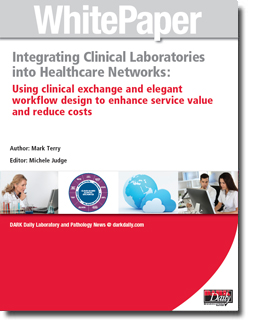 This FREE White Paper providing you with a detailed discussion on the complexities of integrated healthcare networks, and how clinical diagnostic laboratories can utilize a clinical exchange solution to cut costs and improve workflow. This FREE White Paper providing you with a detailed discussion on the complexities of integrated healthcare networks, and how clinical diagnostic laboratories can utilize a clinical exchange solution to cut costs and improve workflow.

|
|
 This white paper will look at the risks of formalin use, trends in formalin use and disposal, and how laboratory and operating room workflow is affected by it. Alternate methods for storing and preserving pathology specimens will be introduced along with descriptions of changes to workflow, benefits in terms of healthcare worker safety, and the safety and economic benefits of these changes. This white paper will look at the risks of formalin use, trends in formalin use and disposal, and how laboratory and operating room workflow is affected by it. Alternate methods for storing and preserving pathology specimens will be introduced along with descriptions of changes to workflow, benefits in terms of healthcare worker safety, and the safety and economic benefits of these changes.

|
|
 This white paper addresses the major challenges facing clinical diagnostic laboratories and pathology groups, obstacles to efficiency and the challenges to sustaining quality in the face of a complicated, dynamic regulatory and reimbursement environment. It addresses the economics of cloud computing and business intelligence solutions and the need for developing strategic partnerships with real-time insight into key performance indicators. It presents three case studies of how laboratory facilities have met those challenges. This white paper addresses the major challenges facing clinical diagnostic laboratories and pathology groups, obstacles to efficiency and the challenges to sustaining quality in the face of a complicated, dynamic regulatory and reimbursement environment. It addresses the economics of cloud computing and business intelligence solutions and the need for developing strategic partnerships with real-time insight into key performance indicators. It presents three case studies of how laboratory facilities have met those challenges.

|
|
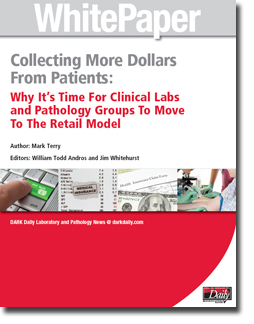 This free clinical laboratory white paper provides information about a technological solution for collections that will allow laboratories and other providers the necessary patient and payer information needed to collect monies owed at the point of patient contact. It presents information regarding the cultural and infrastructure changes that need to be implemented in order for labs, pathology groups and healthcare institutions to shift to a retail model. This free clinical laboratory white paper provides information about a technological solution for collections that will allow laboratories and other providers the necessary patient and payer information needed to collect monies owed at the point of patient contact. It presents information regarding the cultural and infrastructure changes that need to be implemented in order for labs, pathology groups and healthcare institutions to shift to a retail model.

|
|
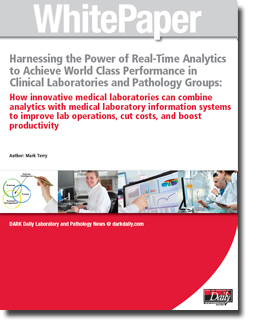 This free clinical laboratory white paper will address current trends in health care and the clinical laboratory testing marketplace, deficiencies in today’s generation of medical laboratory information systems, how lab-focused business analytics can be applied to Lean quality processes, and provide in-depth case studies of clinical laboratories utilizing business software solutions to meet those goals. This free clinical laboratory white paper will address current trends in health care and the clinical laboratory testing marketplace, deficiencies in today’s generation of medical laboratory information systems, how lab-focused business analytics can be applied to Lean quality processes, and provide in-depth case studies of clinical laboratories utilizing business software solutions to meet those goals.

|
|
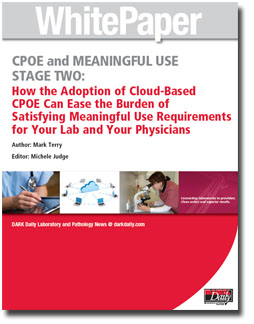 Most clinical laboratory managers know that the HITECH Act, part of the American Recovery and Reinvestment Act (“ARRA”) of 2009, was designed to promote and expand the adoption of health information technology (“HIT”). To that end, the U.S. Department of Health and Human Services (“HHS”) was allotted $25.9 billion to create incentives and to fund the adoption of HIT. Expansion and adoption of HIT will necessarily impact the spectrum of healthcare providers, including hospitals, physicians, medical laboratories and pathology groups. Most clinical laboratory managers know that the HITECH Act, part of the American Recovery and Reinvestment Act (“ARRA”) of 2009, was designed to promote and expand the adoption of health information technology (“HIT”). To that end, the U.S. Department of Health and Human Services (“HHS”) was allotted $25.9 billion to create incentives and to fund the adoption of HIT. Expansion and adoption of HIT will necessarily impact the spectrum of healthcare providers, including hospitals, physicians, medical laboratories and pathology groups.

|
|
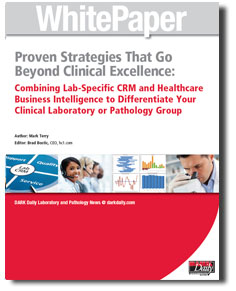 Increasing competition. Reimbursement cuts coming from countless angles. Mounting pressure to shift healthcare to a fee-for-value paradigm. Among a perfect storm of factors threatening the future profitability of labs that have historically grown at a healthy rate, there’s never been a more urgent time for clinical and anatomic pathology laboratories to focus on non-clinical aspects of their business in order to differentiate themselves. Increasing competition. Reimbursement cuts coming from countless angles. Mounting pressure to shift healthcare to a fee-for-value paradigm. Among a perfect storm of factors threatening the future profitability of labs that have historically grown at a healthy rate, there’s never been a more urgent time for clinical and anatomic pathology laboratories to focus on non-clinical aspects of their business in order to differentiate themselves.

|
|
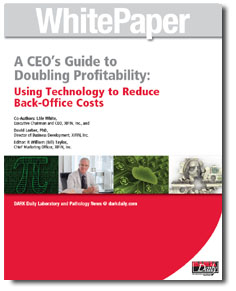
The ultimate goal of any commercial venture is to increase profitability. Significantly increasing overall profitability frequently requires substantial changes to a business (e.g., mergers/ acquisitions, in-licensing or developing new products, or divestiture of unprofitable business units). Building on earlier white papers in the CEO’s Guide series, this white paper will look at relatively benign changes that clinical laboratory management can undertake. Although less dramatic than other options, they can still result in a doubling of lab profitability.

|
|
 Macroeconomic pressure, increased governance, organizational changes, and technological advances are driving pervasive and lasting changes in the fabric of the healthcare system. Because diagnostic services influence the majority of healthcare decisions, changes to healthcare are magnified in the diagnostic services segment. Failure to aggressively adapt to this dynamic environment can easily imperil diagnostic service providers. Macroeconomic pressure, increased governance, organizational changes, and technological advances are driving pervasive and lasting changes in the fabric of the healthcare system. Because diagnostic services influence the majority of healthcare decisions, changes to healthcare are magnified in the diagnostic services segment. Failure to aggressively adapt to this dynamic environment can easily imperil diagnostic service providers.

|
|
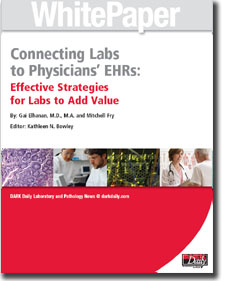 The American healthcare system is in the process of significant change. Healthcare represents the fastest growing segment of our GDP, accounting for 17.3% of expenditures in 2009 and 19.3% projected for 20191, with Medicare and Medicaid representing 35% of that segment. Most metrics and outcome measures indicate that our healthcare system is operating inefficiently and that we are not getting our fair share from our investment. There is a broad consensus that these trends are unsustainable and that a change is mandated. The American healthcare system is in the process of significant change. Healthcare represents the fastest growing segment of our GDP, accounting for 17.3% of expenditures in 2009 and 19.3% projected for 20191, with Medicare and Medicaid representing 35% of that segment. Most metrics and outcome measures indicate that our healthcare system is operating inefficiently and that we are not getting our fair share from our investment. There is a broad consensus that these trends are unsustainable and that a change is mandated.

|
|
 Innovation in immunohistochemistry (IHC) staining has evolved significantly over the last two decades. The process of staining has shifted from labor-intensive, manual techniques toward semi-automated instruments with off-line processes such as deparaffinization and antigen retrieval, and now to a new generation of baking-through-staining automated instrumentation systems that enable standardization, improved staining consistency, and expedited turnaround times. Innovation in immunohistochemistry (IHC) staining has evolved significantly over the last two decades. The process of staining has shifted from labor-intensive, manual techniques toward semi-automated instruments with off-line processes such as deparaffinization and antigen retrieval, and now to a new generation of baking-through-staining automated instrumentation systems that enable standardization, improved staining consistency, and expedited turnaround times.

|
|
 Reimbursement and commercialization are significant challenges in this era of personalized medicine and comparative effectiveness. Many traditional clinical laboratories and early stage startup companies are trying to enter this space and are struggling to evaluate both the market and its offerings. According to Gene Tests, a publicly funded medical genetics information resource, the availability of new diagnostic tests increases 10% annually. Reimbursement and commercialization are significant challenges in this era of personalized medicine and comparative effectiveness. Many traditional clinical laboratories and early stage startup companies are trying to enter this space and are struggling to evaluate both the market and its offerings. According to Gene Tests, a publicly funded medical genetics information resource, the availability of new diagnostic tests increases 10% annually.

|
|
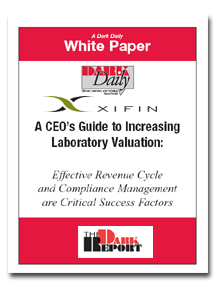 There is no doubt that the complexity of laboratory revenue cycle management is unmatched in all of health care. With frequent regulatory and compliance rules changes, ever tightening margins, and a severely weakened economy, it is getting harder and harder for potentially acquirable independent labs to be sure they are not leaving potential profits on the table. There is no doubt that the complexity of laboratory revenue cycle management is unmatched in all of health care. With frequent regulatory and compliance rules changes, ever tightening margins, and a severely weakened economy, it is getting harder and harder for potentially acquirable independent labs to be sure they are not leaving potential profits on the table.

|
|
 This white paper will explore the various components of automating a high-volume serology lab, detailing a schema for platform consolidation, which can lead to efficiency, productivity and quality improvements, ultimately driving significant reductions in cost. This white paper will explore the various components of automating a high-volume serology lab, detailing a schema for platform consolidation, which can lead to efficiency, productivity and quality improvements, ultimately driving significant reductions in cost.

|












 This free clinical laboratory white paper provides information about a technological solution for collections that will allow laboratories and other providers the necessary patient and payer information needed to collect monies owed at the point of patient contact. It presents information regarding the cultural and infrastructure changes that need to be implemented in order for labs, pathology groups and healthcare institutions to shift to a retail model.
This free clinical laboratory white paper provides information about a technological solution for collections that will allow laboratories and other providers the necessary patient and payer information needed to collect monies owed at the point of patient contact. It presents information regarding the cultural and infrastructure changes that need to be implemented in order for labs, pathology groups and healthcare institutions to shift to a retail model.








